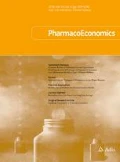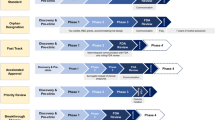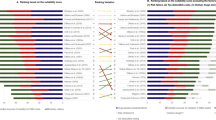Abstract
The National Institute for Health and Care Excellence (NICE) invited Gilead, the company manufacturing ledipasvir-sofosbuvir (LDV/SOF), to submit evidence for the clinical effectiveness and cost effectiveness of LDV/SOF for treating chronic hepatitis C. The School of Health and Related Research (ScHARR) Technology Assessment Group was commissioned as the Evidence Review Group (ERG). This paper describes the company’s submission (CS), the ERG review and the subsequent decision of the NICE Appraisal Committee (AC). The ERG produced a critical review of the clinical effectiveness and cost-effectiveness evidence of LDV/SOF based upon the CS. The clinical effectiveness data for LDV/SOF were taken from ten trials: three phase III trials and seven phase II trials. Trials compared different durations of LDV/SOF, with and without ribavirin (RBV). There were no head-to-head trials comparing LDV/SOF with any comparator listed in the NICE scope. Data from the trials were mostly from populations with genotype 1 (GT1) disease, although some limited data were available for populations with genotypes 3 and 4. For GT1 treatment-naïve patients, sustained viral response for 12 weeks (SVR12) rates for LDV/SOF ranged from 93.1 to 99.4 % for subgroups of patients with non-cirrhotic disease, whilst SVR rates of 94.1 to 100 % were reported for subgroups of patients with compensated cirrhosis. For GT1 treatment-experienced patients, SVR12 rates ranging from 95.4 to 100 % were reported for subgroups of non-cirrhotic patients, and SVR rates ranging from 81.8 to 100 % were reported within subgroups of patients with compensated cirrhosis. Comparator data were not searched systematically as part of the submission, but were based on the company’s previous NICE submission of sofosbuvir, with additional targeted searches. The ERG’s critical appraisal of the company’s economic evaluation highlighted a number of concerns. The ERG’s base case analyses suggested that the incremental cost-effectiveness ratios (ICERs) for LDV/SOF (+RBV) are dependent on (a) treatment durations, (b) whether patients have been previously treated and (c) whether patients have liver cirrhosis or not. The AC concluded that it was appropriate to use the approach taken in the ERG’s exploratory analyses, in line with the marketing authorisation, which considered people with and without cirrhosis separately, and estimated the cost effectiveness for each recommended treatment duration of LDV/SOF.
Similar content being viewed by others
References
National Institute for Health and Clinical Excellence (NICE) Guide to the methods of technology appraisal. London, NICE 2013 Available at: http://www.nice.org.uk/. 2008.
Gilead Sciences Inc. Manufacturer/sponsor submission of evidence for Single Technology Appraisal (STA) of ledipasvir-sofosbuvir for treating chronic hepatitis C [ID742]—Company submission. 2014.
Thokala P, Simpson E, Tappenden P, Stevens JW, Dickinson K, Ryder S et al. Ledipasvir-sofosbuvir for treating chronic hepatitis C: a Single Technology Appraisal, School of Health and Related Research (ScHARR), 2015. 2015.
National Institute for Health and Care Excellence, Single Technology Appraisal (STA): ledipasvir-sofosbuvir for treating chronic hepatitis C [ID742]. 2015.
European Medicine Agency. European Public Assessment Report—Harvoni. London: EMA; 2014.
National Institute for Health and Care Excellence, Final appraisal determination ledipasvir-sofosbuvir for treating chronic hepatitis C [ID742]. 2015.
Afdhal N, Zeuzem S, Kwo P, Chojkier M, Gitlin N, Puoti M, et al. Ledipasvir and sofosbuvir for untreated HCV genotype 1 infection. N Engl J Med. 2014;370(20):1889–98.
Afdhal N, Reddy KR, Nelson DR, Lawitz E, Gordon SC, Schiff E, et al. Ledipasvir and sofosbuvir for previously treated HCV genotype 1 infection. N Engl J Med. 2014;370(16):1483–93.
Kowdley KV, Gordon SC, Reddy KR, Rossaro L, Bernstein DE, Lawitz E, et al. Ledipasvir and sofosbuvir for 8 or 12 weeks for chronic HCV without cirrhosis. N Engl J Med. 2014;370(20):1879–88.
Martinot-Peignoux M, Stern C, Maylin S, Ripault MP, Boyer N, Leclere L, et al. Twelve weeks posttreatment follow-up is as relevant as 24 weeks to determine the sustained virologic response in patients with hepatitis C virus receiving pegylated interferon and ribavirin. Hepatology. 2010;51(4):1122–6.
Chen J, Florian J, Carter W, Fleischer RD, Hammerstrom TS, Jadhav PR, et al. Earlier sustained virologic response end points for regulatory approval and dose selection of hepatitis C therapies. Gastroenterology. 2013;144(7):1450–5.
National Instiute for Health and Care Excellence. Hepatitis C (chronic)—sofosbuvir: consultation document. ID654. London: NICE; 2014.
Wright M, Grieve R, Roberts J, Main J, Thomas HC. Health benefits of antiviral therapy for mild chronic hepatitis C: randomised controlled trial and economic evaluation. Health Technol Assess. 2006; 10(21):1–113, iii.
Contributions of Authors
Emma Simpson critiqued the clinical effectiveness evidence data reported by the company. Kath Dickinson critiqued the searches undertaken by the company. John Stevens critiqued statistical analyses undertaken by the company. Praveen Thokala and Paul Tappenden critiqued the mathematical model provided and the cost‐effectiveness evidence submitted by the company. Praveen Thokala undertook the additional analyses by the ERG. Dr Steve Ryder and Dr Phillip Harrison provided clinical advice to the ERG throughout the project. All authors were involved in drafting and commenting on the final version to be published. This summary has not been externally peer reviewed by PharmacoEconomics.
Author information
Authors and Affiliations
Corresponding author
Ethics declarations
Funding
This project was funded by the National Institute for Health Research (NIHR) Health Technology Assessment (HTA) Programme (Project Number 14/59/01 STA). See the HTA programme website for further project information (http://www.hta.ac.uk). This summary of the ERG report was compiled after NICE issued the FAD. The views and opinions expressed herein are those of the authors and do not necessarily reflect those of NICE or the Department of Health.
Conflict of interest
Dr. Steve Ryder has attended paid advisory boards for Gilead and other companies with products in this therapeutic area (Roche, MSD, Abbvie, Janssen and Novartis). None of the other authors have any conflicts to declare.
Rights and permissions
About this article
Cite this article
Thokala, P., Simpson, E.L., Tappenden, P. et al. Ledipasvir-Sofosbuvir for Treating Chronic Hepatitis C: A NICE Single Technology Appraisal—An Evidence Review Group Perspective. PharmacoEconomics 34, 741–750 (2016). https://doi.org/10.1007/s40273-016-0387-y
Published:
Issue Date:
DOI: https://doi.org/10.1007/s40273-016-0387-y




